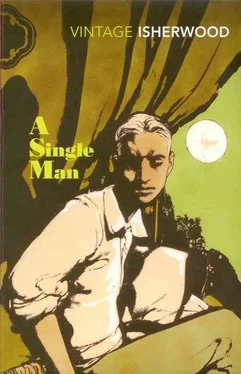Mr Pordage’s sex-life is unconvincing.
Mr Propter is a Jeffersonian democrat, an anarchist, a Bolshevik, a proto-John-Bircher.
Mr Propter is an escapist. This is illustrated by the conversation with Pete about the Civil War in Spain. Pete was a good guy until Mr Propter brainwashed him and he had a failure of nerve and started to believe in God.
Huxley really understands women. Giving Virginia a rose-coloured motor scooter was a perfect touch.
And so on and so forth. . . . George stands there smiling, saying very little, letting them enjoy themselves. He presides over the novel like an attendant at a carnival booth, encouraging the crowd to throw and smash their targets; it’s all good clean fun. However, there are certain ground rules which must be upheld. When someone starts in about mescaline and lysergic acid, implying that Mr Huxley is next door to being a dope addict, George curtly contradicts him. When someone else coyly tries to turn the clef in the roman – is there, couldn’t there be some connection between a certain notorious lady and Jo Stoyte’s shooting of Pete? – George tells him absolutely not; that fairy tale was exploded back in the thirties.
And now comes a question George has been expecting. It is asked, of course, by Myron Hirsch, that indefatigable heckler of the goyim. ‘Sir, here on page 79, Mr Propter says the stupidest text in the Bible is they hated me without a cause . Does he mean by that the Nazis were right to hate the Jews? Is Huxley anti-semitic?’
George draws a long breath. ‘No,’ he answers mildly. And then – after a pause of expectant silence; the class is rather thrilled by Myron’s bluntness – he repeats, loudly and severely, ‘No —
‘Mr Huxley is not anti-semitic. The Nazis were not right to hate the Jews. But their hating the Jews was not without a cause. No one ever hates without a cause —
‘Look – let’s leave the Jews out of this, shall we? Whatever attitude you take, it’s impossible to discuss Jews objectively nowadays. It probably won’t be possible for the next twenty years. So let’s think about this in terms of some other minority, any one you like, but a small one – one that isn’t organised and doesn’t have any committees to defend it —’
George looks at Wally Bryant with a deep shining look that says, I am with you, little minority-sister. Wally is plump and sallow-faced, and the care he takes to comb his wavy hair and keep his nails filed and polished and his eyebrows discreetly plucked only makes him that much less appetising. Obviously, he has understood George’s look. He is embarrassed. Never mind! George is going to teach him a lesson now that he’ll never forget. Is going to turn Wally’s eyes into his timid soul. Is going to give him courage to throw away his nail-file and face the truth of his life —
‘Now, for example, people with freckles aren’t thought of as a minority by the non-freckled. They aren’t a minority in the sense we’re talking about. And why aren’t they? Because a minority is only thought of as a minority when it constitutes some kind of a threat to the majority, real or imaginary. And no threat is ever quite imaginary. Anyone here disagree with that? If you do, just ask yourself: what would this particular minority do if it suddenly became the majority, overnight? You see what I mean? Well, if you don’t – think it over!
‘All right – now along come the liberals – including everybody in this room, I trust – and they say, ‘minorities are just people, like us’. Sure, minorities are people; people , not angels. Sure, they’re like us – but not exactly like us; that’s the all-too-familiar state of liberal hysteria, in which you begin to kid yourself you honestly cannot see any difference between a Negro and a Swede —’ (Why, oh why daren’t George say ‘between Estelle Oxford and Buddy Sorensen’? Maybe, if he did dare, there would be a great atomic blast of laughter, and everybody would embrace, and the kingdom of heaven would begin, right here in classroom 278. But then, again, maybe it wouldn’t.)
So, let’s face it, minorities are people who probably look and act and think differently from us, and have faults we don’t have. We may dislike the way they look and act, and we may hate their faults. And it’s better if we admit to disliking and hating them, than if we try to smear our feelings over with pseudo-liberal sentimentality. If we’re frank about our feelings, we have a safety-valve; and if we have a safety-valve, we’re actually less likely to start persecuting. . . . I know that theory is unfashionable nowadays. We all keep trying to believe that, if we ignore something long enough, it’ll just vanish —
‘Where was I? Oh yes. . . . Well, now, suppose this minority does get persecuted – never mind why – political, economic, psychological reasons – there always is a reason, no matter how wrong it is – that’s my point. And, of course, persecution itself is always wrong; I’m sure we all agree there. . . . But, the worst of it is, we now run into another liberal heresy. Because the persecuting majority is vile, says the liberal, therefore the persecuted minority must be stainlessly pure. Can’t you see what nonsense that is? What’s to prevent the bad from being persecuted by the worse? Did all the Christian victims in the arena have to be saints?
‘And I’ll tell you something else. A minority has its own kind of aggression. It absolutely dares the majority to attack it. It hates the majority – not without a cause, I grant you. It even hates the other minorities – because all minorities are in competition; each one proclaims that its sufferings are the worst and its wrongs are the blackest. And the more they all hate, and the more they’re all persecuted, the nastier they become! Do you think it makes people nasty to be loved? You know it doesn’t! Then why should it make them nice to be loathed? While you’re being persecuted, you hate what’s happening to you, you hate the people who are making it happen; you’re in a world of hate. Why, you wouldn’t recognise love if you met it! You’d suspect love! You’d think there was something behind it – some motive – some trick —’
By this time, George no longer knows what he has proved or disproved, whose side, if any, he is arguing on, or indeed just exactly what he is talking about. And yet these sentences have blurted themselves out of his mouth with genuine passion. He has meant every one of them, be they sense or nonsense. He has administered them like strokes of a lash, to whip Wally awake, and Estelle too, and Myron, and all of them. He who has ears to hear, let him hear —
Wally continues to look embarrassed – but, no, neither whipped nor awakened. And now George becomes aware that Wally’s eyes are no longer on his face; they are raised and focused on a point somewhere behind him, on the wall above his head. . . . And now, as he glances rapidly across the room, faltering, losing momentum, George sees all the other pairs of eyes raised also – focused on that damned clock. He doesn’t need to turn and look for himself; he knows he must be running overtime. Brusquely, he breaks off, telling them, ‘we’ll go on with this on Monday’. And they all rise instantly to their feet, collecting their books, breaking into chatter.
Well, after all, what else can you expect? They have to hurry, most of them, to get someplace else within the next ten minutes. Nevertheless, George’s feathers are ruffled. It’s been a long time since last he forgot and let himself get up steam like this, right at the end of a period. How humiliating! The silly enthusiastic old prof, rambling on, disregarding the clock, and the class sighing to itself, ‘He’s off again!’ Just for a moment, George hates them, hates their brute basic indifference, as they drain quickly out of the room. Once again, the diamond has been offered publicly for a nickel, and they have turned from it with a shrug and a grin, thinking the old peddler crazy.
Читать дальше












